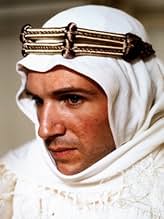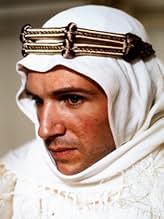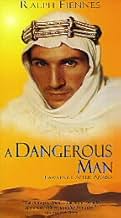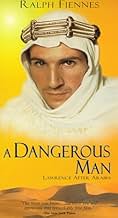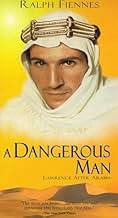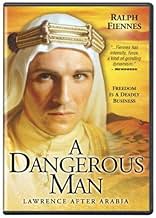VALUTAZIONE IMDb
6,8/10
750
LA TUA VALUTAZIONE
Aggiungi una trama nella tua linguaLawrence and Feisal go to argue for Arab independence at the 1919 Paris Peace Conference.Lawrence and Feisal go to argue for Arab independence at the 1919 Paris Peace Conference.Lawrence and Feisal go to argue for Arab independence at the 1919 Paris Peace Conference.
Alexander Siddig
- Feisal
- (as Siddig El Fadil)
Trama
Lo sapevi?
- QuizJoseph Fiennes, in his uncredited debut, plays brother Ralph Fiennes' character Lawrence's younger brother. He had to sneak out of school during a lunch break to play the bit-part.
- Citazioni
T. E. Lawrence: All men dream; but not equally. Those who dream by night in the dusty recesses of their minds Awake to find that it was vanity; But the dreamers of day are dangerous men. That they may act their dreams with open eyes to make it possible.
- ConnessioniEdited into Great Performances: A Dangerous Man: Lawrence After Arabia (1992)
Recensione in evidenza
The great Lawrence of Arabia fights side-by-side with the Arabs to help save Arabia from Turkish invaders. Fade to black. Roll credits. End of story.
Well, not entirely. A Dangerous Man: Lawrence After Arabia, tells more. In this movie, T.E. Lawrence (Ralph Fiennes) goes to Paris with Feisal (Alexander Siddig) to argue for Arab independent rule during the 1919 Paris Peace Conference. In Paris, instead of the shifting sands of the desert, Feisal and Lawrence encounter shifting political alliances.
If you're interested in current Middle East affairs, this movie provides some insight. It portrays the division of the Middle East into "spheres of influence." England, France, and the United States would each be responsible for a particular sphere. Feisal and Lawrence want Great Britian to make good on their wartime promise to create Syria as an independent Arab state. However, Britian now supports France as the eventual ruler of Syria.
A brief scene shows Lawrence watching a worker oiling a chandelier. Lawrence explains to his companion, "If France gets Syria, we [the British] get the Persian Gulf." His companion replies that if Britian must choose between loyalty to Feisal or access to petroleum... well, Feisal doesn't stand a chance.
Through Feisal, we get some sense of how the Arabs must have felt as their homeland was carved into pieces of pie for the powerful, oil-hungry Western world. It's interesting that, through most of the movie, Feisal speaks to other officials only through Lawrence although Feisal speaks fluent English. In fact, Feisal relies on Lawrence to not only interpret but, in some cases, to create his thoughts. While this may or may not be historically accurate, it certainly highlights Feisal's precarious position.
The movie briefly questions Lawrence's motives in helping Feisal. (`I want Syria to be our first brown dominion,' says Lawrence, `and I can do it with my Arabs.') Ultimately, though, it portrays him as a well-intentioned man caught up in politics that are out of his control. Syria did, in fact, go to France. In the 1920s, however, Britian supported Feisal as ruler of a new Arab kingdom - Iraq.
Terrifically acted by Ralph Fiennes and Alexander Siddig, this movie wraps up the loose ends of the Lawrence of Arabia legend. By the time the credits roll, you know much more about who, how, and why than you did before.
Well, not entirely. A Dangerous Man: Lawrence After Arabia, tells more. In this movie, T.E. Lawrence (Ralph Fiennes) goes to Paris with Feisal (Alexander Siddig) to argue for Arab independent rule during the 1919 Paris Peace Conference. In Paris, instead of the shifting sands of the desert, Feisal and Lawrence encounter shifting political alliances.
If you're interested in current Middle East affairs, this movie provides some insight. It portrays the division of the Middle East into "spheres of influence." England, France, and the United States would each be responsible for a particular sphere. Feisal and Lawrence want Great Britian to make good on their wartime promise to create Syria as an independent Arab state. However, Britian now supports France as the eventual ruler of Syria.
A brief scene shows Lawrence watching a worker oiling a chandelier. Lawrence explains to his companion, "If France gets Syria, we [the British] get the Persian Gulf." His companion replies that if Britian must choose between loyalty to Feisal or access to petroleum... well, Feisal doesn't stand a chance.
Through Feisal, we get some sense of how the Arabs must have felt as their homeland was carved into pieces of pie for the powerful, oil-hungry Western world. It's interesting that, through most of the movie, Feisal speaks to other officials only through Lawrence although Feisal speaks fluent English. In fact, Feisal relies on Lawrence to not only interpret but, in some cases, to create his thoughts. While this may or may not be historically accurate, it certainly highlights Feisal's precarious position.
The movie briefly questions Lawrence's motives in helping Feisal. (`I want Syria to be our first brown dominion,' says Lawrence, `and I can do it with my Arabs.') Ultimately, though, it portrays him as a well-intentioned man caught up in politics that are out of his control. Syria did, in fact, go to France. In the 1920s, however, Britian supported Feisal as ruler of a new Arab kingdom - Iraq.
Terrifically acted by Ralph Fiennes and Alexander Siddig, this movie wraps up the loose ends of the Lawrence of Arabia legend. By the time the credits roll, you know much more about who, how, and why than you did before.
I più visti
Accedi per valutare e creare un elenco di titoli salvati per ottenere consigli personalizzati
Dettagli
Contribuisci a questa pagina
Suggerisci una modifica o aggiungi i contenuti mancanti

Divario superiore
By what name was A Dangerous Man: Lawrence After Arabia (1992) officially released in Canada in English?
Rispondi
